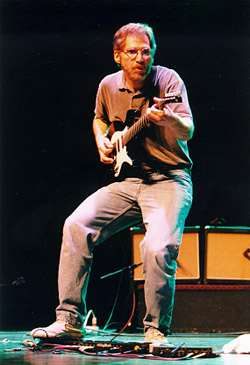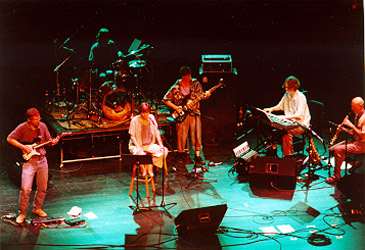Interview

(Progressive Newsletter Nr.34 02/01)
excerpts from an interview with Mike Johnson (Guitars)
From an early age - as early as I can remember - perhaps 3 years old - I loved certain classical records that my mother owned, that she would play on our old mono hi-fi occasionally, specifically the Tchaikovsky Piano Concerto #1, Beethoven's Symphony #5 and Mozart's "Overture to the Marriage of Figaro". I memorized every note of these. Then my uncle gave us an LP of the "Billy the Kid" ballet suite by Aaron Copland. This was too modern for my folks, but my brothers and I adored it. Unfortunately, despite an obvious great interest and ear for music at an early age, my mother did not even consider music lessons for me, because, as she says, her own had been too unpleasant. So, a great pianist or violinist I was not to be. When I was 11 years old in 1961my parents bought me a cheap acoustic guitar for Christmas. They only did it because they got an old Kay electric guitar from my cousin, which they gave to my older brother. They thought I might be jealous, so they got me the lousy acoustic. As it happened, I basically just looked at it for a year, wondering what I was supposed to do with it. It was when I was 12 that I saw a chord diagram in E major on the front of chord book in a store window. I realized that # "1" meant index finger, # "2" meant middle finger, and so on. This was a revelation! I memorized the diagram, went home and tried it, and "boom!" I was playing guitar. I progressed from there in a blur, learning by ear from Rolling Stones and Beatles records.
What are your inspirations, your influences and how has changed it the years?
When I was a teenager I loved Jimi Hendrix and Sergeant Peppers era Beatles. When I was 17 my older brother re-introduced me to 20th century orchestra/art music, in particular Stravinsky, Shostakovich, Copland and Benjamin Britten. I have loved them ever since and have discovered many others that I love, such as William Schuman, Samuel Barber, Michael Tippet, Prokofiev, Bartok and others. At about the same time in 1970 I discovered King Crimson, ELP, Yes and a little later Genesis and Gentle Giant. I became a fanatic of the progressive rock movement. I also liked Mahavishnu Orchestra, Weather Report and Soft Machine a little. I wrote my first true progressive rock music for a group of high school buddies who had a band called 'Zaahh'. They were into progressive rock - the had a sax and did a pretty good cover of "Pictures of the city" by Crimson. I was not actually in the band, and before anything could develop, I was forced to join the Navy to avoid being drafted and sent to Vietnam. So, for 4 years I practiced guitar in various barracks and apartments. I began to write tunes in the style of Genesis and Mahavishnu - 12 string picky things with flangy singing distortion guitar lines. A friend turned me on to Henry Cow in 1975. It took a while, but I became very "into" them. When I had been out of the Navy about two years in 1978 and was in college, I met Bob Drake, who amazingly liked all the same progressive artists that I liked. Shortly thereafter, we became big fans of the Art Bears. We started making recordings with an old stereo reel-to-reel and cassette decks. Among these were three of my 'progrock' tunes, which were very 70s in flavor, but starting to show some harmonic oddities. In about 1980 we did a cassette recording of the first song that could be called Thinking Plague in terms of rhythm, harmony and overall style. It was called 'Doppelganger' and, I think, shows the definite influence of Crimson mixed with Art Bears. Around then I wrote the song Warheads, which I think really begins to show my own style. Since then, I have been developing more in my own direction. My main influences are still the 20th century composers, but I have also been effected by the work of my friends like Dave Kerman from the 5uu's with whom I toured in 1995 and Dave Willey from Hamster Theater, with whom I also currently play. Kerman turned me onto Albert Marceour who I think is an incredible genius. Dave Willey has opened my mind more to European-style ethnic influenced progressive music like Nimal, and to Gypsy music, which is unbelievable.
You come from the 80th, a decade with no good music, the pop/disco time. Your music is totally in another way, can you tell us why?
Actually, as you can see from what I've said, I come from the 60s and 70s. By the 80s, I had a pretty clear idea of what I wanted to do. Thinking Plague grew out of Bob Drake's and my love of 70s progressive, Art Bears / Henry Cow and experimentation and playing around with the recording process. We were only slightly influenced by, or concerned with, the so-called 'new wave' - which is maybe evident in our song "How to clean squid" on our first LP. Also, we liked Peter Gabriel's 3rd and 4th records, which I think is evident in the song "Moonsongs." He and I liked the Police, but they never influenced Thinking Plague although he and I had a progressive pop band in 1983 with Mark Fuller and Eric Moon called Emergency, which had a heavy Police meets Crimson flavor. The band broke up before we could make a serious recording.

Some years ago you have played live in Germany in Würzburg with the 5uu's. Some members of 5uu's and Thinking Plaque are the same. Are there a lot of musicians playing in both maybe in more - bands?
Actually, when I played with 5uus, Thinking Plague was basically in hibernation. Bob and Dave and I had been the core of the last Thinking Plague from 1990-94. Bob had joined 5uus and they asked me to tour with them in 1995. I was never an 'official' member and have not performed on any 5uu's records. After that Dave returned to America from France where he had been living with Bob. I was trying to resurrect Plague, and when I asked him, he agreed to play drums again. After he worked with Deborah Perry in Plague, he asked her to sing on his new CD, "Regarding purgatories". The main reason for our trading members like this is, frankly, the rarity of people who are sufficiently skilled and also desiring to perform such music. Such people are rare.
The voice of Deborah Perry is brilliant, the melodic lines for her voice pure genius. They are in an extremely other way than all the bands I have ever heard before. Who is composing these melodic lines and how are they composed? Where do all the ideas come from?
All of the vocal melodies that Deborah sings on "In Extremis" are my work. In general, I wrote most of the music and words on that CD, with the exception of the vocals and words on "This weird wind" which is from Bob and the words for "Behold the man" from Kerman and me. Where do the ideas come from? I don't know. I usually get chordal or rhythmic ideas before vocal lines. My requirements for a vocal part are quite a bit different than for an instrumental line. I try to hear a vocal line in my head that focuses or weaves together whatever is going on in the music, or perhaps that struggles against what's going on, in a "good" way. Hehehe! Of course, I always try to keep in mind the singer's range and sound in different registers.
What kind of music do you hear?
As I said above, I listen mostly to orchestral music, mostly of the 20th century, but I also like some ethnic styles, such as traditional Irish, some Gypsy and Balkan music, old Beatles' songs, sometimes whatever pop song happens to be on the radio in the car. Unlike so many people involved with my genre of music, I don't listen to lots of musical groups, and I don't own a huge collection of CDs. I do have all the symphonies of Shostakovich, and a lot of other similar stuff. That kind of thing soothes me and excites without blotting out my own little creations - which are rather simple little things by comparison.

What's your life outside the band? What is your job?
I do work at a college, but not usually as a teacher. I am a counselor / advisor. The program I work for is not related to music, but is related to computer technology. It is a good job that gives me quite a bit of freedom, and allows me to be paid for helping people, instead of exploiting them.
Even though you don't play so much concerts, is there a chance to see you playing in Europe?
We played in France and Italy this last July and August. Last fall we did a tour of the eastern and midwest USA, and in June played at the North East Art Rock Festival - NEARFest 2000 - in Pennsylvania. But these were the first shows we had in 9 years! We cannot tour often, because of the cost, but I hope that we will return to Europe for a full tour after we release our next studio CD, which is expected to be in Spring of 2002. It is very difficult to tour and to not lose money when you play non-commercial music. So, we have to wait until we have another new release in order to generate enough interest and press. However, if we get an invitation to a good festival before then, then we will probably do it.
When you're playing live, do you record your shows? I'm very curious about them to hear!
We have been recorded live a number of times, usually 'board mixes' or two mics and a DAT. But we were recorded on 24 tracks at ProgDay '99, a festival in North Carolina. I have not heard the tapes, but I know the show had a lot of energy, although it was only our second show since '91. We had a very good show in Chicago last year, which was recorded in stereo in the room and as a 'board mix.' I may try to edit and master it for possible release, but it's not terribly good sounding. Naturally, we are not able to create a live sound as big or produced as our CDs. Arrangements have to be changed to accommodate the limits of our instrumentation. On our CDs you may hear sometimes two or three guitar parts, three or four saxes and clarinets, several different keyboards, and multiple vocal tracks, and so on, all at the same time. But in reality, there is only one vocalist, one guitar, one sax player, one keyboardist, and so on. But we do pretty well, and we have fun.
Volkmar Mantei © Progressive Newsletter 2001